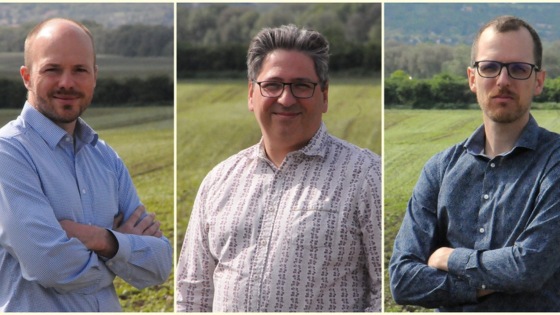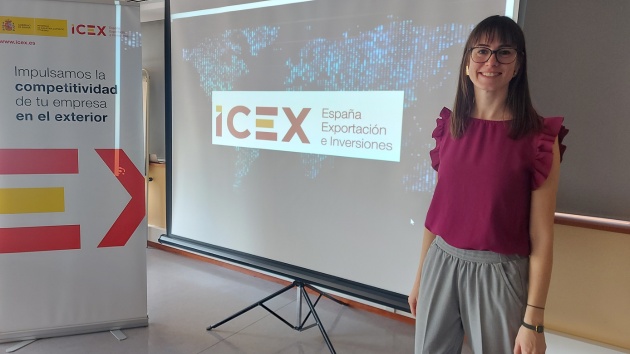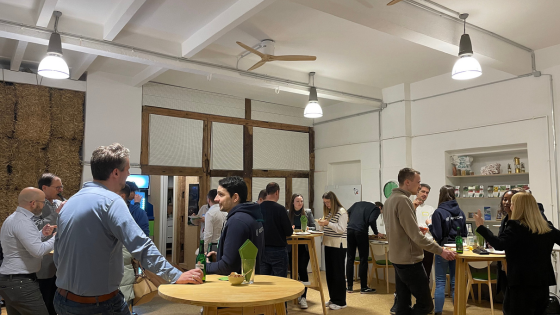The Lower Saxony startup partnership “Agrifood Osnabrück-Hannover” is the new location of the nationwide Digital Hub Initiative (de:hub) of the Federal Ministry of Economics and Climate Protection (BMWK). This marks the establishment of the first de:hub in Lower Saxony. The BMWK announced the selection decision today at the Startup Summit Germany in Berlin. Agrifood Osnabrück-Hannover” is the first de:hub in Lower Saxony and is dedicated to the development and promotion of pioneering technologies in the agrifood sector.
Recent posts by Linh Pham
3 min read
RootCamp becomes part of de:hub AgriFood Osnabrück/Hannover
By Linh Pham on Sep 17, 2024 2:32:27 PM
Topics: News
6 min read
Verdancy is bringing the new gold standard in pesticide delivery
By Linh Pham on Apr 11, 2024 1:05:25 PM
Verdancy is a spin-off from the Schwaneberg Group at RWTH Aachen University and DWI – Leibniz Institute for Interactive Materials. The startup from RootCamp Batch#5 is committed to enhance plant protection in response to our dynamic biodiversity loss. Central to their mission is the advancement of environmentally friendly and highly efficient methods to promote plant health. We spoke with founder Nikola Mijailovic about how Verdancy is reshaping pesticide delivery, ensuring effective crop protection while addressing environmental challenges in agriculture.
Topics: Startup Bios startups Interview
4 min read
Regen Insight - Environmental analytics for regenerative agriculture
By Linh Pham on Apr 10, 2024 2:02:41 PM
Agriculture is one of the world's largest producers of greenhouse gas emissions. However, the widespread adoption of climate-friendly practices could transform agricultural soils into one of the largest carbon sinks in the world, effectively removing carbon from the atmosphere. In response to this urgent need for climate action, Regen Insight from RootCamp Batch #5 aims to help farmers make the transition to regenerative agriculture. The developed MRV (Monitoring, Reporting and Verification) platform helps farmers understand their carbon footprint and develop actionable plans funded by carbon credits linked to their environmental impact. Using advanced technologies, including satellite and soil data, Regen Insight accurately measures emissions reduction and carbon storage on farms, ensuring the credibility of sustainable actions. Learn how Regen Insight empowers farmers to transition to regenerative practices and discover their future plans in our interview with CEO and founder Etienne Variot.
Why did you decide to start a startup, and how did the idea for Regen Insight come about?
After 5 years working in finance, I wanted to use my skills for a cause that mattered to me: protecting our environment and restoring our natural ecosystems. Launching a start-up was clearly the most action-oriented approach and offered interesting challenges. Following eight months of discussions with experts, deep dives into climate change, biodiversity, and natural capital, and exploration of various solutions, my co-founder Samuel and I came to understand that farmers would play a key role in meeting our collective environmental ambitions. We realized that farmers did not have any simple solution to understand and track their carbon footprint, and they faced a financing gap to transition to regenerative agriculture.
Can you explain the process of how your MRV platform works and how it benefits farmers?
The Regen Insight platform is designed for any farming organization to onboard and assist farmers in transitioning to carbon farming through a white-label solution. We strengthen and support their relationship. Within the platform, farmers can calculate their carbon footprint, devise action plans, and track their progress. Our partners can engage with farmers at every stage, offering guidance on pertinent farming practices. Additionally, once the transition project is underway, partners can generate and trade carbon credits to reward farmers for their carbon performance.
What makes your solutions stand out from the existing ones on the market?
We have two major strengths. Firstly, we've invested over two years exclusively in refining the user experience, resulting in a seamless process where farmers independently create their action plans in under an hour. This breakthrough enables partners to rapidly scale operations and significantly reduce technical support costs on farms. Partners can focus primarily on advising farmers rather than data collection. Our pilot project in France showcased remarkable results, with one partner effortlessly engaging 60 farms in just three months.
Secondly, we boast one of the largest scientific teams in the field. As the first Tier 3 MRV (the highest ranking) in Europe and pioneers in utilizing satellite imagery to automatically verify regenerative practices implementation, we quickly aligned with leading carbon accounting standards such as ISO 14-064 and the GHG Protocol. This creates trust in the carbon credits we generate.
Could you share some success stories or case studies of farms that have benefited from Regen Insight's services?
Our pilot project in France showcased remarkable results, with one partner effortlessly engaging 60 farms in just three months. They achieved this with very limited costs, as only two part-time technicians offered farms this new service, seizing the opportunity to strengthen their relationship with farmers. To illustrate this success story with clear figures, their carbon program covers nearly 25,000 hectares and allows for the generation of 30,000 carbon credits per year. In terms of value, this new commodity represents over €1 million per year that will be paid to their farms.
The RootCamp Accelerator program is almost over. How has the program been helpful to you?
RootCamp has been a valuable partner over the past few months as we've initiated our expansion across Europe. Not only is RootCamp a gateway to Germany, providing numerous introductions to local players, but it has also offered highly relevant advice, particularly in refining and communicating our value proposition. Despite being a team of seasoned entrepreneurs, with almost 5 years into the project now, the level of expertise from participating experts enabled us to keep improving.
What's coming up next?
We started our European expansion with rooted operations in France and Eastern Europe. We are pleased to support new partners eager to begin producing and benefiting from this new carbon commodity. Additionally, we are closely monitoring the evolution of the CRCF (the European framework for carbon credits in agriculture), with the intention of deploying it across Europe as soon as it comes into force. We are thrilled to witness our vision coming to life as more and more farmers confidently engage in regenerative agriculture.
Benefit from the RootCamp Accelerator program like the startup Regen Insight. Startups from the Agtech and Bioeconomy sectors can apply for the new batch until May 30th.
Topics: Startup Bios Interview
3 min read
Startup Seedrise accelerates the global shift to regenerative agriculture
By Linh Pham on Apr 5, 2024 2:57:35 PM
The Berlin-based startup Seedrise, led by a team of researchers, is incorporating biochar into new sustainable farming products through a revolutionary formula. Their innovative approach aims to develop solutions for farmers facing challenges such as dry soils and water scarcity. This not only accelerates the global transition to regenerative agriculture but also contributes to climate protection. We talked with the founder, Johannes Musiol, to delve into the origins of Farmula's mission and explore the potential impact of their approach on sustainable agriculture.
Explain how Seedrise's seed-coating solution works, and what sets it apart from traditional methods?
Typically, farmers drill seeds into the ground, apply fertilizer several times, and spray chemicals for plant protection. However, this way of farming comes with three downsides: Firstly, plants only receive macronutrients such as NPK and do not enjoy valuable growth enhancers such as biostimulants, mycorrhiza, and other microorganisms. Secondly, much of the fertilizer applied is lost due to leaching and evaporation, which is not only a huge economic loss but also a massive climate burden. Lastly, current plant protection products greatly harm our soils, making them less fertile.
Our seed coating tackles all those problems at the same time. While normal seed coatings have very thin layers and do not offer a lot of space for agricultural inputs, our coating, which is based on biochar, offers tremendous space for everything the plant needs. As a result, we are able to apply all necessary nutrients as well as other growth enhancers directly to the seed. Everything applied is used by the plant and cannot leach or get lost in any other way. This way, we are able to increase yields and reduce costs while cutting CO2 emissions at the same time.
What impact doesyour technology have on reducing CO2 emissions in agriculture?
Our impact on climate stems from two primary sources. Through the application of biochar and microorganisms to the soil, we bolster natural carbon sequestration, fostering healthier soil and promoting humus buildup. Additionally, our coating ensures fertilizer remains intact, minimizing wash-off and loss. This approach anticipates a reduction of mineral fertilizer application by over 50%, translating to roughly 1 ton/ha for corn. Consequently, this not only saves costs and enhances soil health, but also significantly reduces CO2 emissions.
What advantages does your seed coating have for farmers?
They'll enjoy higher yields thanks to growth enhancers such as biostimulants, microorganisms, and mycorrhiza, as well as from healthier soils in the long run, which contain more humus and provide better protection against high temperatures. Additionally, they can streamline operational processes, reducing costs associated with fuel, personnel, and machinery. Lastly, we anticipate eligibility for CO2 certificates due to reduced mineral fertilizer usage and more sustainable farming practices.
Currently, our product is not yet available for sale. However, farmers should expect to be able to purchase our products in 2025, initially focusing on corn and rapeseed, either directly through us or via our partners.
How did you come up with the idea for your product?
We have been working with biochar for many years and have always been amazed by its ability to improve soils and increase yields. Biochar is particularly relevant due to its capacity to enhance soil health, sequester carbon, and promote sustainable agriculture practices. After developing several fertilizer-related products, creating a seed coating utilizing biochar seemed like the logical next step.
How has RootCamp supported your startup along the way?
RootCamp has been an amazing experience, and we have particularly benefited from the vast network and expertise of its mentors. As a startup, you cannot receive enough feedback to focus on the things that are truly important.
Update 2024:
Seedrise has successfully closed its pre-seed funding round, with significant investment from several business angels including Ingo Schütte.
➡️ Do you want to level up your startup like Seedrise and benefit from the unique ecosystem of innovation hub RootCamp? Sign up for our newsletter and follow us on LinkedIn to not miss the next application deadline.
Topics: Startup Bios Interview
3 min read
Smarterra – Building Tomorrow’s Mediterranean AgriFood Ecosystems
By Linh Pham on Mar 15, 2024 5:17:14 PM
RootCamp goes Italy! We are part of the Smarterra project, an EU-funded initiative aimed at fostering a resilient innovation ecosystem in Southern Italy focused on food and agriculture.This project specifically addresses the challenges faced by the AgriFood sector in the region, with a focus on enhancing Southern Italy's AgriFood industry. Covering 344,000 agricultural companies and 34,000 agri-food businesses, the project plays a crucial role in supporting the development and competitiveness of the regional economy. Despite its economic significance, the AgriFood sector in Southern Italy encounters growth challenges, particularly related to limited funding sources, impacting local startups and scale-ups, especially those led by women. Smarterra seeks to bridge this funding gap by attracting foreign investors and informing European capital providers about the promising opportunities within Southern Italy's AgriFood sector.
2 min read
Financial Times Ranking: RootCamp and SpinLab among Top Startup-Hubs in Europe
By Linh Pham on Mar 14, 2024 9:30:00 AM
RootCamp and SpinLab are positioned among the top Startup Hubs in Europe, as highlighted in the recent ranking "Europe's Leading Startup Hubs 2024" by the Financial Times and Statista. We have secured the 2nd place in Germany, placing ourselves among the top 3 Accelerators in Germany and ranked 12th among the top 15 in Europe.
4 min read
10 Female AgTech founders from Europe you should know in 2024
By Linh Pham on Mar 7, 2024 10:35:14 AM
Women are underrepresented in the AgTech industry, as is the case in many other technology-related fields. However, the number of female founders in AgTech and AgriFood is growing. Despite the challenging fundraising landscape, female founders and emerging fund managers in Europe have demonstrated resilience. The recently published "The State of Gender Diversity in European Venture report 2024" by Female Foundry, highlights this resilience. According to the study, in 2023, European startups co-founded by women secured a total of €5.9 billion in funding. After the peak years of 2021 and 2022, this amount marks 2023 as the third-highest year on record in terms of funding raised. PitchBook's European VC Female Founders Dashboard reveals mixed companies currently claim the largest share of capital at 19.2%, reaching its highest level in over a decade.
Topics: Startup Tips startups RootCamp
5 min read
Proofminder - leaf-level farming platform
By Linh Pham on Feb 29, 2024 10:24:41 AM
Meet Proofminder, a Budapest-based startup founded in 2023 by Norbert Havas and Ambrus Vancso and Simon Levente currently part ofRootCamp Batch #5. Proofminder's technology integrates advanced AI with drone-acquired visual data, providing precise insights at the leaf level across extensive agricultural areas. It enables meticulous plant monitoring, accurately identifies stress factors, diseases, and weeds, while also supporting various agricultural needs such as stand counting, weather damage analysis, and nitrogen assessment. Delve in this interview into their innovative approach to tackling agricultural challenges through AI-powered precision solutions.
How does your AI-powered platform actively address the challenges in agriculture that you aim to overcome?
According to the EU’s Farm to Fork strategy, the amount of chemical pesticides and more hazardous pesticides should be reduced by 50% by 2030, while at least 25% of agricultural land in the EU should be under organic farming. Today’s intensive agriculture requires proactive and constant usage of chemicals to protect the yield and quality from different pests. The FAO estimates that annually between 20-40% of global crop production is lost to pests.
For this reason, various kinds of pesticides, herbicides, insecticides, fungicides, etc. are constantly used during the growing season on fields and in horticulture. Pesticide usage was between 350,000-400,000 tons per year between 2011 and 2019. The amount did not decrease substantially despite the communicated directives of the European Union. One reason for this could be that in the case of traditional, non-differentiated spraying, chemicals are not sprayed where their effect is required on the plants, mainly due to technological constraints and because the infected area is unknown. This can result in a huge waste of chemicals, further increasing their negative impact on the environment.
How does Proofminder differentiate itself from existing precision agriculture solutions?
Mainstream precision agriculture concentrates on fields and zoning, mainly based on satellite imagery or digital scouting, and cannot address many agricultural challenges. Proofminder brings precision agriculture to the next level by enabling growers to shift their focus from plots to individual plants. The platform extracts insights from visual data, mostly drone images, using AI to provide growers with valuable information and actionable reports about every square centimeter of their fields throughout the season. The number of use cases is almost unlimited, and thanks to a complete infrastructure, new use cases (or AI models) can be trained in a few days and scaled to as many hectares as needed. With an end-to-end approach, growers can innovate production processes without specialized knowledge. Our proven use cases show increased ROI (2-5x), improved food quality, and resource savings up to 80%, including reduced inputs, chemicals, labor costs, and CO2 emissions.
Moreover, our reporting flexibility integrates seamlessly with leading industry solutions. For example, hyper-precise spot spraying maps can be easily uploaded to equipment like John Deere sprayers or DJI spraying drones for efficient implementation.
Can you share specific use cases illustrating the environmental benefits of integrating AI, especially in missed tassel detection and intelligent weed mapping in agriculture?
Examples include geo-referenced plant population analysis, hyper-precise weed detection, and spot spraying maps, wildlife or weather damage analysis, yield assessment or loss, among others. Once a grower identifies the use case, we cover the entire journey – from image gathering to providing time-sensitive and hyper-precise reports in various formats.
Use case of missed tassel detection for corn seed production. Photo: Proofminder
We collaborate extensively with crop producers, orchards, tree farms, and seed production companies. Our most popular high-ROI use cases involve missed tassel detection in hybrid corn to enhance seed quality and weed detection maps that can be exported to any spraying machine or drone, allowing for intelligent field spraying and saving up to 80% on chemicals and budget.
In 2023, we processed over 1000 hectares in the system and executed projects on three continents, spanning various countries in Europe, South Africa, and India. In December 2023, we expanded our presence by hiring representatives in Brazil and Australia to explore new markets and are currently seeking pilot projects in these locations. Our customer base includes top seed companies and large farms, with some names undisclosed due to NDA agreements. However, we showcase the logos and case studies of the rest on our website.
Provide insights on the future of AI in agriculture, and how do you plan to stay at the forefront?
We do see the awareness and adoption of technologies on farms of all sizes, which is great. A few years ago, having a drone on the farm or utilizing AI in the production process sounded like rocket science, and now growers who implemented precision AgTech solutions see great outcomes and are willing to scale. Every day, we speak with growers and drone service providers, hearing ideas for new use cases. We are open to joint innovations and dedicate slots for this each month. Recently, we launched new UI and self-service features in the platform. These new features will make it easier to start and use our platform, both for growers and drone service providers.
What do you want to achieve during the RootCamp acceleration program?
Reviewing our strategy, positioning, and company evaluation is a very good opportunity for us now. The key success indicators of our participation would be new industry connections, increased awareness, and piloting or joint innovation with a farm or seed production company. Also, we are currently raising the next round and are open to new connections with investors.
For a closer look at Proofminder's platform, we invite you to join us during our upcoming Demo Day on April 10th at the RootCamp Headquarters. Here, you can meet the founders and explore the features and benefits in detail. Get a ticket Demo Day ticket here.
Topics: Startup Bios Interview
3 min read
Desafía FoodTech Germany: Catalyzing Spanish FoodTechs startups' success in Germany
By Linh Pham on Feb 27, 2024 9:57:18 AM
Desafía FoodTech Germany x RootCamp is a six-month program collaboratively initiated by ICEX Spain (the Internationalization Agency of the Spanish Government) and RootCamp. The Desafía FoodTech Germany program aims to foster growth and success for startups through collaborative initiatives, networking events, and access to valuable resources within the competitive German market.
Topics: News startups agtech applynow agfoodtech FoodTech
5 min read
10 AgTech and FoodTech startup events you should not miss in 2024
By Linh Pham on Feb 13, 2024 1:53:46 PM
The year has started strong with events like Grüne Woche in Berlin, where Lower Saxony showcases its pioneering role in food production, innovation, and sustainability within an expansive exhibition area organized by Startup Niedersachsen. But there are still plenty more events to come in the world of AgTech and AgriFood. Navigate through the sea of opportunities with this curated list of 10 must-attend AgTech and FoodTech startup events.
NEW FOOD FESTIVAL, STUTTGART
FEBRUARY 28th - MARCH 1st, STUTTGART
The largest gathering in German-speaking Europe for startups and innovators across the food value chain features over 100 exhibitors along with a lineup of international speakers and experts. Expect interesting talks and discussions on topics such as “Can we still master the agri-food transformation before the climate changes our food system?” or “Pimp my Business - startups as an innovation driver for SMEs”.It is the perfect opportunity for you to network with fellow startups and innovators in food, agriculture, gastronomy, and retail from the DACHLI (Germany, Austria, Switzerland and Liechtenstein) region.
/rootcamp_logo_white_2022.png?width=2123&height=630&name=rootcamp_logo_white_2022.png)

/RC%20logo%202022.png?width=2325&height=703&name=RC%20logo%202022.png)

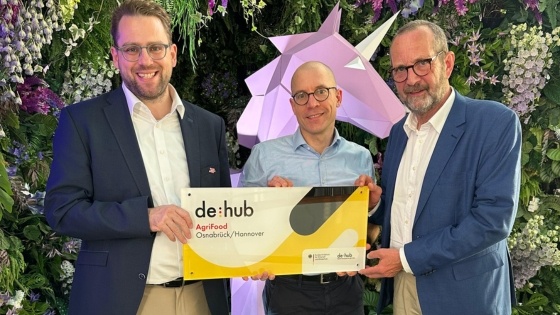

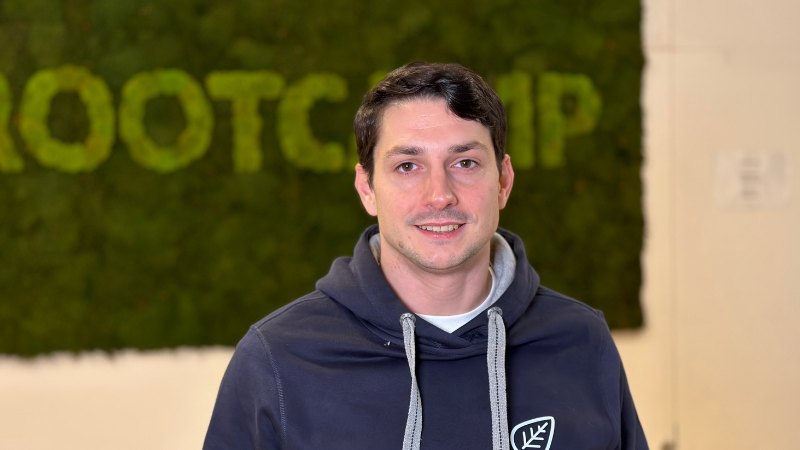
.jpg)
.jpg)
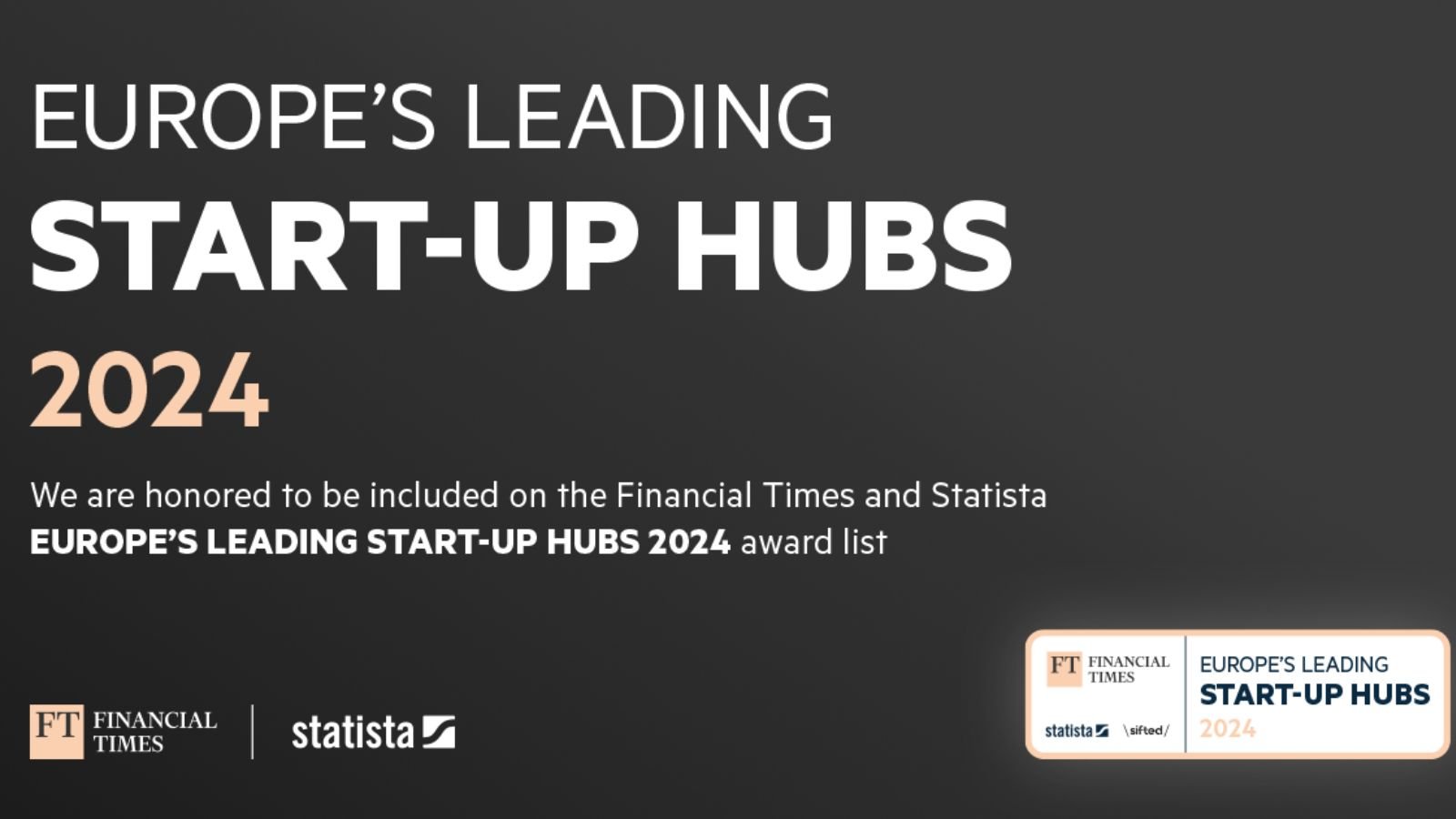
.jpg)
